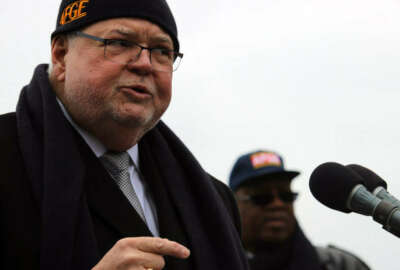
Judge dismisses most claims in lawsuit alleging misconduct by former AFGE head
The underlying lawsuit against AFGE and former president J. David Cox remains active in federal court, but the judge dismissed all but four of the 11 counts the...
A federal judge on Wednesday dismissed large swaths of a lawsuit alleging that the former leader of the largest federal employee union engaged in sexual misconduct and financial malfeasance, and that lower-level union officials were complicit in his behavior.
The 67-page ruling by Judge John Bates of the U.S. District Court for the District of Columbia does not mean that the case against the American Federation of Government Employees and its former president, J. David Cox, is over. But most of the suit’s most serious counts were dismissed over jurisdictional and other legal issues.
A dozen current and former AFGE employees, officers, contractors and family members sued the union, Cox and other union officials last summer, alleging Cox engaged in sexual harassment, discrimination and misappropriation of union funds over a period of years, and that the union’s national leadership failed to intervene.
In all, the plaintiffs listed 11 separate counts in their lawsuit. Wednesday’s decision disposes of all but four of those. And significantly, the court ruled the plaintiffs could only pursue the remaining claims against Cox and the union itself — not against the 13 other union officials and staff members who had been named individually in the lawsuit.
Judge Bates found, for instance, that the lawsuit failed to make a persuasive case that lower-level AFGE officers had a duty to prevent the behavior Cox is alleged to have engaged in.
“Plaintiffs are not wrong that the individual AFGE defendants had the ability to take additional actions to address allegations of misconduct against Cox,” he wrote. “But that does not mean that the individual AFGE defendants violated their fiduciary duties to AFGE.”
The four counts left standing in the lawsuit against Cox and the union allege that the former president misused AFGE resources, including by using a contracted limousine service to visit bars and strip clubs, that he wrongfully terminated an employee on the basis of racial discrimination, and that Cox and AFGE created a hostile work environment for racial minorities.
The next step in the case is for the plaintiffs to amend their lawsuit to remove the claims Judge Bates disallowed on Wednesday; that pleading is due by Sept. 1. Cox and AFGE will have until Sept. 22 to answer the remaining allegations.
Many of the most serious complaints — including those involving allegations of sexual assault and sexual harassment — were tied to alleged violations of District of Columbia law. And while federal courts can sometimes decide those sorts of local tort claims, they can only invoke that sort of “supplemental jurisdiction” in certain circumstances, such as when the underlying claims raise viable allegations that the same defendants also violated federal law, the judge wrote.
Those D.C. law-based claims were dismissed, in large part, because in the same ruling, Judge Bates also dismissed many of the key federal law violations the plaintiffs alleged under the Labor Management Reporting and Disclosure Act.
“The court will decline to exercise supplemental jurisdiction over all non-federal claims in this lawsuit because the non-federal claims substantially predominate over the surviving federal ones,” he wrote. “To do otherwise would require the court to expend a substantial amount of resources wading through dozens of sets of non-federal claims — which arise under an unknown variety of different state laws — that have no meaningful connection to any remaining federal claims in this case. And it would mean that the individual AFGE defendants — who no longer have any federal claims lodged against them — would nonetheless be forced to defend against this bevy of non-federal claims in federal court.”
Copyright © 2025 Federal News Network. All rights reserved. This website is not intended for users located within the European Economic Area.
Jared Serbu is deputy editor of Federal News Network and reports on the Defense Department’s contracting, legislative, workforce and IT issues.
Follow @jserbuWFED




